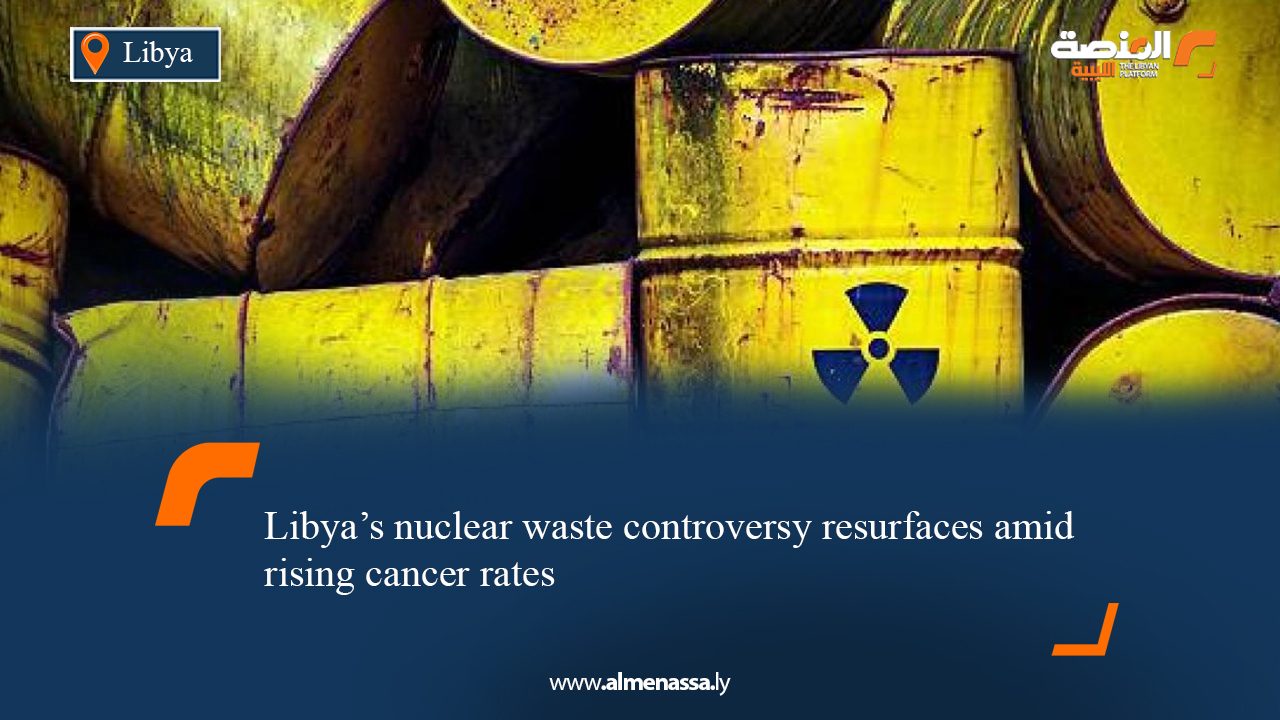Report by Huda El-Ghitani
A long-dormant environmental scandal has re-emerged in Libya, as concerns mount over the alleged burial of nuclear waste along the country’s coastline and desert interior — a claim that has gained renewed attention amid a sharp rise in cancer diagnoses.
Environment Minister Ibrahim Al-Arabi reignited the debate this week by acknowledging persistent rumours about nuclear dumping, while stopping short of a full denial. “These reports fall into the realm of propaganda,” he said, “but we cannot dismiss them entirely. It’s a difficult scenario to prove or disprove.”
Al-Arabi noted that radiation monitoring, conducted in cooperation with Libya’s Centre for Radiological Measurements, has so far found no evidence of contamination. However, he admitted that Libya’s porous borders and limited surveillance capacity since 2011 make the country vulnerable to covert dumping operations.
The minister stressed that transporting nuclear waste requires complex procedures and international oversight, particularly by the International Atomic Energy Agency (IAEA), which tracks waste volumes and destinations. Still, he warned that Libya could be targeted due to its vast, unmonitored terrain.
Parliament calls for criminalisation of nuclear dumping
The issue was previously raised in 2021 by Libya’s parliamentary delegation at the Rome Climate Conference. Ramadan Shambesh, head of the legislative and constitutional committee, urged global action to criminalise the export of nuclear waste to conflict zones and developing nations, calling it “an international crime.”
Military reports suspicious aircraft and vessels
Libya’s Air Force Chief of Staff, Brigadier Mahmoud Issa, has claimed that unidentified civilian aircraft and suspicious vessels have been dumping waste in the southern desert and territorial waters. He alleged that some of these operations were linked to Israeli Occupation, and warned of severe environmental consequences.
Issa said the military had tracked flight paths of aircraft entering Libyan airspace undetected due to the absence of radar systems in the south. Naval forces also reportedly observed ships releasing containers believed to contain nuclear waste.
Allegations of covert regional dumping
The Natour Research Centre has accused Israel of collaborating with rebel groups in Chad to transport nuclear waste across the Libyan desert — part of a strategy to relocate hazardous material away from Israeli settlements.
Separately, Mahmoud Saada, deputy head of the Middle East division at the International Physicians for the Prevention of Nuclear War (IPPNW), warned of radioactive leaks from Israel’s Dimona reactor. He claimed the contamination had reached groundwater near Libya, as well as areas in Saudi Arabia and Jordan.
Mafia and Mediterranean dumping
A 2013 Independent investigation revealed that Italian mafia networks were paid up to €20 billion annually to dispose of hazardous waste in the southern Mediterranean, including Libya. A former Greenpeace activist cited evidence that these groups handled nearly 30% of Italy’s waste output — around 40 million metric tons per year.
The report linked marine pollution to nuclear dumping, citing mass whale deaths off the coast of Sirte as a possible indicator of radioactive contamination.
Tunisia’s border legacy
In 2020, former Tunisian MP Safi Said claimed that the regime of Zine El Abidine Ben Ali had buried nuclear waste near the borders with Algeria and Libya, triggering regional environmental concerns.
According to Inter Press Service, the cost of burying one ton of hazardous waste in Africa is just $2.50 — compared to $250 in Europe — making the continent a cheap and vulnerable target for illegal disposal.
Cancer cases on the rise
While no official confirmation of nuclear waste has been issued, Libya’s cancer rates continue to climb. As of February, the country had recorded over 21,000 cases, according to Haidar Al-Sayeh, head of the National Cancer Control Authority.
Between denial and circumstantial evidence, the burden of proof remains elusive. But for many Libyans, the growing health crisis is reason enough to demand deeper investigation and urgent environmental safeguards.


